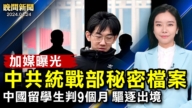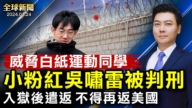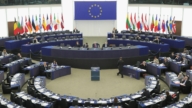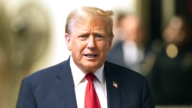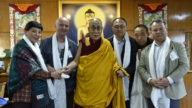【新唐人2014年03月31日讯】3月28号,中共领导人习近平到访德国。德国总统和总理在会见习近平时都提及中共的人权、言论自由等问题,但中方并未就此作出任何回应。外界评论,近年来中共在人权问题上表现越发强硬,越来越不接受西方国家对它恶劣人权状况的批评。那么我们就来看一看这背后的缘由。
中共领导人习近平继续在欧洲各国访问。3月28号上午,德国总统约阿希姆•高克在柏林总统府设午宴接待习近平。高克在致词中提及了公民权利问题,他表示:中共有必要平衡执政者和被执政者以及各宗教团体之间的关系,否则后果就是“不和、冲突和暴力”。高克呼吁,中共应该在不使用暴力的情况下缓解冲突。
28号下午,德国总理梅克尔在与习近平会面时,也提及中国大陆的人权问题。梅克尔谈到:在一个不断变化的世界中,对于中、德来说,能够广泛而自由的表达意见是非常重要的,这是促进社会进步的重要因素。但双方都没有在记者会上公开谈及人权相关话题。
旅美中国问题独立评论员李善鉴谈到,多年来,西方一些政府曾经私下和中共谈论人权问题,但很少有明确而公开的表态,所以很难对中国的人权状况带来比较大的影响。
旅美中国问题独立评论员李善鉴:“对于中共政权来讲,只要是没有在公开的场合,没有强大的公众压力,它(中共)是不会在意的。它可以跟你私下说些冠冕堂皇的话,但最后它什么都兑现不了。”
89年“六四”天安门大屠杀之后,中共为免于西方的严厉制裁而玩起人权游戏,在一些重大国际活动之前释放个别政治犯,来缓解人权问题上的压力,同时把这作为与西方做交易的筹码。
李善鉴:“但是这个事情,大家看得越来越清楚。无论对于中共自己作为筹码来讲,还是对于西方一些政客作为他自己交代来讲,这个作用都不那么大了。甚至在很大程度上有一定的讽刺意义。”
《美国之音》报导,过去中共在人权议题上的让步,让中共得以逃避制裁和责难。如果中国在上世纪90年代就失去了美国市场,中国就很难有后来的经济发展。这种有限的人权让步,让中共达到了其他的外交目标,这包括国是访问的成功、和2001年加入世界贸易组织、以及2008年的北京奥运会等。
但近年来中共改变了策略,在人权问题上采取了更强硬的态度,拒绝西方的批评,甚至对此进行报复。
北京维权人士曹顺利,因为呼吁中共当局在制定人权计划时,听取民众声音,而在登机前往瑞士日内瓦,参加“联合国人权理事会”的“普遍定期审议”时,被北京警方关押。随后,曹顺利身体状况急剧恶化,但当局拒绝将她释放,也不对她进行治疗,直到曹顺利深度昏迷才被送往医院,致使曹顺利于3月14号死亡。
旅美中国社会问题研究人士张健:“中国人权问题对于中共政府来说,是一个不能碰的地方,因为一旦它去谈的话,将会面临更多的问题。在大量的事实面前,它无法来回应中国(中共)政府长期以来有组织、有预谋的去迫害本国人民这些事实。”
旅美中国社会问题研究人士张健谈到,西方国家千万不能相信中共在人权法制方面的所谓“建设”,因为中共从来都是“说一套做一套”,它就是要固守中共的邪恶体制,绝不会进行根本的改变。张健强调,不管怎样,对于中共来说,天怒人怨之下,任何一个维权事件都有可能导致中共的解体。
采访/朱智善 编辑/李谦 后制/孙宁
Xi Jinping Makes No Response to Merkel’s Human Rights Charge
On March 28, Chinese Communist leader Xi Jinping
visited Germany.
Xi made no response to the human rights and freedom
of expression,
when questioned by the German President and
Prime Minister during their meetings.
It is highly criticized, that over years of Communist rule,
the CCP has become more tough and reluctant to respond to
the criticisms from the Western world,
the appalling and devastating human rights issues
faced by many over the years in China.
Let’s find out the reason why.
China’s leader Xi Jinping is visiting Europe at present.
On the morning of March 28, the German President Joachim
Gauck hosted a luncheon at the Presidential Palace.
In the speech, Gauck reminded Xi “the balancing of interests
between the governed and the governing and among China’s
religious groups was a necessity.”
He warned, “The alternative to that would be discord, conflict
and violence."
Gauck does not believe in resolving conflict using violence.
By the afternoon of March 28, Chancellor Angela
Merkel met with Xi Jinping,
she too mentioned the issue of human rights in
mainland China.
Merkel said, the topic was an “important" part of German-
Chinese dialogue,
stressing how important freedom of expression
is in an ever changing world.
However, neither side mentioned the human rights issue
at the press conference.
Independent commentator Li Shanjian, indicates that for years,
the Western world have conducted human rights talks
with the Communist regime.
However, the talks are always held only in private,
and very rarely held out openly in public view.
Therefore, the impact to China’s human rights is very limited.
Li Shanjian, independent commentator: “The Communist
regime would not care,
as long as it is not public and there is no public pressure.
They might talk about some high-sounding words privately,
but would not care to deliver on it."
After the Tiananmen Square massacre in 1989, the CCP
conducted the human rights game,
avoiding any international sanctions by releasing individual
political prisoners.
It was to relieve the international pressure on human rights and
to serve as a bargaining chip.
Li Shanjian: “But we have seen it more and more clearly,
whether it is a bargaining chip to the CCP or a promise of
individual Western politicians, the effect is very small.
It has been quite ironic to a large extent."
Voice of America reported that the past compromises of the
CCP on the human rights issue,
had saved China from sanctions and condemnation.
China was thus able to continue its market in the U.S. during
the 1990s and the subsequent economic development.
This limited concession on human rights, has allowed the
Communist regime to achieve its other foreign goals,
including the states visit, the 2001 joining of the World Trade
Organization, as well as the 2008 Beijing Olympics.
But in recent years, the CCP has taken a tougher stand in its
strategy on the human rights issue.
They have declined the Western criticisms,
even sort reveng upon the criticism.
Beijing activist Cao Shunli had called for the CCP to listen to
the people’s voice in drafting China’s human rights review.
She was arrested on her way to participate in the UN Human
Rights Council meeting in Beijings airport.
The authorities had refused to release her or provide medical
treatment, even when her health was seriously deteriorating.
Cao Shunli remained in custody until she was in a deep
coma,eventually dying on March 14.
Zhang Jian, China’s social problems researcher: “China’s
human rights issue is a taboo subject to the CCP,
because more problems will be exposed if it’s allowed
to be discussed openly.
Facing the mass of facts, the CCP can not deny the systematic
and premeditated persecution of the Chinese
over the years of its ruling."
China’s social problems researcher Zhang Jian warns the West
not to believe what CCP calls, the construction
of rule of law in human rights.
What it speaks of, does not represent what it does in reality.
Its main purpose was to sustain the CCP’s evil regime.
There exists nor will there ever exist, such fundamental change.
Zhang Jian stresses, the Chinese have been treated
outrageously,
and any mass protests at this juncture, will quite possibly lead
to the total collapse of the CCP.
Interview/Zhu Zhishan Edit/LiQian Post-Production/SunNing


